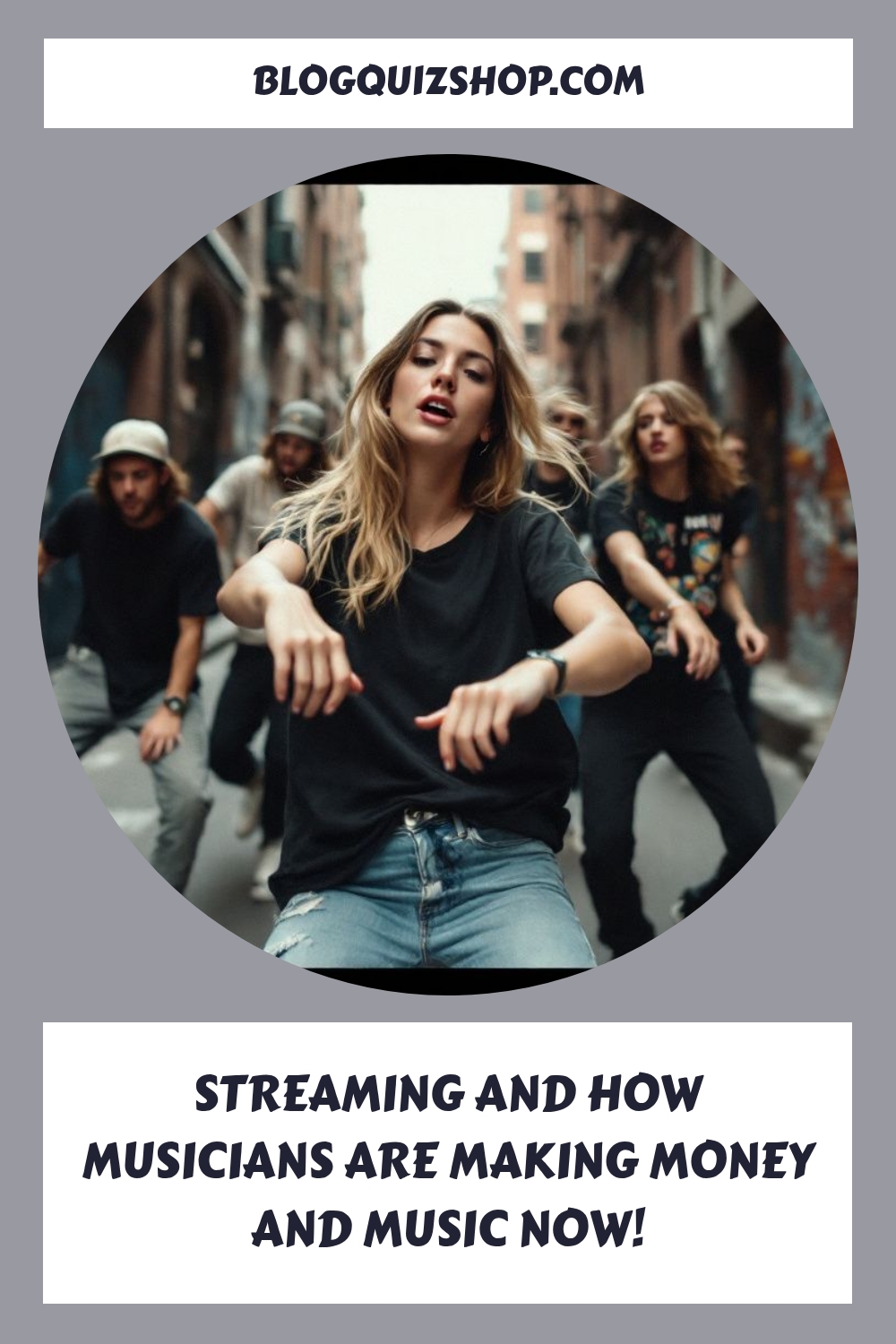Finding your favorite musicians in the vast sea of 21st-century music can feel like a huge task. There are so many artists out there, each with their unique sound and style. It’s easy to get lost.
Kanye West is one artist who stands out. He has released 10 studio albums and produced over 150 albums for others, including big names like Beyoncé and Jay-Z. This fact shows how much impact one artist can have on music today.
Our article will help you discover major artists who shape the music we listen to now. From Kendrick Lamar to Billie Eilish, you’ll learn about the stars lighting up our musical sky.
Get ready to meet your new favorite artist.
Key Takeaways
- Kanye West has made a huge impact on music by producing over 150 albums for other artists and releasing 10 of his own. He mixes different styles like rap, pop, and gospel.
- Musicians such as Kendrick Lamar, Beyoncé, Taylor Swift, Rihanna, and Billie Eilish are shaping the music industry. They win awards and tackle social issues through their songs.
- New stars like Olivia Rodrigo and Post Malone bring fresh sounds to the scene. Their unique styles appeal to young fans globally.
- Music today blends many genres, making it rich and diverse. Listening to these musicians can help you discover new favorites.
- The Arctic Monkeys changed rock with their debut album becoming the fastest-selling in UK history. Frank Ocean influences modern music with his blend of R&B, pop, and hip-hop.
The Major Musicians Making Music
The 21st century has seen a remarkable evolution in pop, hip-hop, rock, and electronic music, with a diverse range of artists shaping the global music landscape. Here’s an overview of the major musicians who have defined music in this era, based on chart success, influence, and critical acclaim.
Billboard’s Greatest Pop Stars of the 21st Century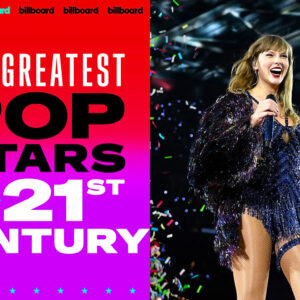
Billboard recently ranked the 25 greatest pop stars of the 21st century, highlighting artists who have exemplified pop greatness through their careers, commercial success, and cultural impact. The top 25, as ranked by Billboard, are:
Beyoncé, Taylor Swift, Rihanna, Drake, Lady Gaga, Britney Spears, Kanye West, Justin Bieber, Ariana Grande, Adele, Usher, Eminem, Nicki Minaj, Justin Timberlake, Miley Cyrus, Jay-Z, Shakira, The Weeknd, BTS, Bruno Mars, Lil Wayne, One Direction, Bad Bunny, Ed Sheeran, Katy Perry
Honorable mentions (alphabetically):
50 Cent, Alicia Keys, Billie Eilish, Cardi B, Carrie Underwood, Chris Brown, Christina Aguilera, Doja Cat, Dua Lipa, Future, Jennifer Lopez, Kelly Clarkson, Kendrick Lamar, Kesha, Lana Del Rey, Lorde, Maroon 5, Megan Thee Stallion, Missy Elliott, Nelly, Olivia Rodrigo, Pink, Post Malone, Sean Paul, SZA.
Chart-Topping and Influential Musicians
Several musicians have consistently topped charts and shaped music trends across the 2000s, 2010s, and into the 2020s:
Taylor Swift
Dominant in both country and pop, with a record number of Billboard 200 number one albums among women.
Drake
Consistently chart-topping with numerous number one albums and singles.
Rihanna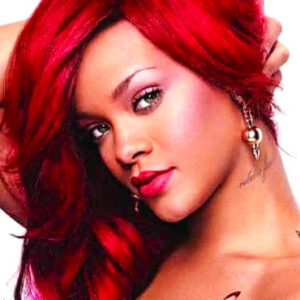
Achieved significant commercial success with multiple number one albums and singles.
Eminem
One of the best-selling artists of the 2000s, with enduring influence in hip-hop.
Beyoncé
Recognized for her influence, performance, and cultural impact, earning the title of “Greatest Pop Star of the 21st Century” from Billboard.
Lady Gaga
Known for her innovative style and influence on pop music.
Kanye West
Changed the landscape of hip-hop and popular music production.
Justin Bieber, Ariana Grande, Adele, Ed Sheeran, Katy Perry: All have had multiple chart-topping hits and albums throughout the century.
Genre-Defining and Critically Acclaimed Musicians
Beyond pure chart performance, some artists have been especially influential in shaping genres and critical discourse:
Kendrick Lamar
Widely regarded as one of the most important hip-hop artists of the 21st century, known for his sharp lyricism and social commentary.
Radiohead
Continued to innovate in rock and electronic music, influencing countless bands.
Amy Winehouse
Revolutionized modern soul and jazz with her unique style.
Arctic Monkeys
Brought Brit rock to global prominence.
Daft Punk
Pioneered electronic and dance music, influencing the EDM scene worldwide.
Notable International Musicians and Band Acts
BTS
South Korean boy band that became a global phenomenon, breaking records in both Western and Asian markets.
One Direction
UK boy band that dominated pop charts in the 2010s.
Bad Bunny
Leading Latin artist, bringing reggaeton and Latin trap to global audience,
SHOP NOW ZAZZLE - CLICK BELOW
How do Billboard’s top Musicians reflect current musical trends?
Billboard’s top Musicians offer a revealing snapshot of current musical trends, reflecting shifts in genre, artist diversity, and the evolving ways audiences consume music.
Genre and Style Trends
Recent Billboard charts show a dominance of pop, R&B, hip-hop, and, increasingly, country and Latin influences, with genre boundaries becoming more fluid. For example, artists like Bad Bunny (Latin), Morgan Wallen (country), and Sabrina Carpenter (pop) have all reached number one in 2025, highlighting the expanding diversity of mainstream music. The rise of artists such as Kendrick Lamar, SZA, and Lady Gaga in top positions also underscores the continued relevance of hip-hop, R&B, and pop, respectively.
Additionally, current chart trends indicate a preference for mid-tempo, easy-listening tracks, often described as resembling “American Idol audition pieces,” with fewer high-energy or experimental hits compared to previous years. However, exceptions like Kendrick Lamar’s “Not Like Us” show that high-energy, socially resonant tracks can still break through.
Artist Diversity and Representation
There has been a marked increase in ethnic diversity and a broader age range among Billboard’s top artists over the past two decades. This reflects a more inclusive music industry and audience. The decline of bands in favor of solo artists is also notable, aligning with changes in music consumption patterns driven by digital platforms. This shift is likely due to the personal branding and storytelling that solo artists can leverage more easily on social media and streaming services.
Digital Consumption and Chart Dynamics
The integration of digital downloads and streaming has revolutionized how songs reach the top of the charts. Since the mid-2000s, digital platforms have allowed a wider variety of artists to chart, increasing the number of songs that make it onto the Billboard Hot 100, though the number of unique artists has not increased at the same rate. Songs now tend to linger longer at the top of the charts, sometimes for months, as streaming algorithms and listener habits favor familiarity and repeat plays.
Cultural Impact and Superstar Influence
Billboard’s recognition of artists like Beyoncé as the “greatest pop star of the 21st century” reflects not just chart success, but also cultural impact, innovation, and the ability to generate iconic moments. Superstars continue to shape trends, but the rise of digital platforms has also allowed newer artists to break through more quickly and challenge established names
Summary Table: Billboard Trends and Implications
| Trend | Billboard Reflection | Industry Implication |
|---|---|---|
| Genre fluidity | Pop, R&B, hip-hop, country, Latin hits | More collaborative, hybrid styles |
| Artist diversity | More ethnicities, ages, solo artists | Inclusive, personalized content |
| Digital consumption | Longer chart stays, streaming dominance | Algorithm-driven, repeat listens |
| Cultural impact | Recognition of influencers like Beyoncé | Branding, visual storytelling |
In summary, Billboard’s top artists mirror a music landscape that is increasingly diverse, digitally driven, and shaped by both superstar influence and new voices breaking through via streaming and social media
What role does social media play in shaping the success of today’s top musicians?
Social media plays a central and transformative role in shaping the success of today’s top artists, fundamentally altering how music is discovered, promoted, and consumed. 
Discovery and Virality
Platforms like TikTok, Instagram, and Twitter have democratized music discovery, allowing artists to reach global audiences without traditional gatekeepers such as record labels or radio stations. Viral trends—such as dance challenges, memes, or snippet-sharing—can catapult unknown artists into the spotlight almost overnight. For example, Lauren Spencer Smith’s song “Fingers Crossed” gained traction after she posted snippets on TikTok, leading to its viral success and global release. Similarly, older songs can be revived and chart anew thanks to user-generated content and social media trends.
Promotion and Engagement
Social media enables artists to engage directly with fans, share behind-the-scenes content, and build a sense of community around their work. Artists use these platforms to announce releases, tease new music, and create interactive experiences that foster loyalty. Features like Instagram’s broadcast channels and TikTok’s duet function allow fans to participate in the creative process, turning listeners into active promoters. This direct engagement not only boosts streaming numbers but also drives merchandise and ticket sales.
Chart Success and Algorithmic Influence
The impact of social media on chart performance is profound. Songs that go viral on TikTok or Instagram often see a surge in streams and downloads, propelling them onto major charts like the Billboard Hot 100. TikTok’s influence is so significant that Billboard has introduced the TikTok Billboard Top 50, tracking songs popular on the platform based on engagement metrics. Social media algorithms prioritize content that generates high engagement, making it essential for artists to create shareable and trend-worthy material.
Monetization and Brand Partnerships
A strong social media presence can attract brand partnerships, sponsorships, and endorsement deals, providing additional revenue streams for artists. Platforms also facilitate the promotion of concert tickets, merchandise, and exclusive content, further monetizing an artist’s digital footprint. Independent artists, in particular, benefit from the ability to promote and monetize their music directly to fans without the need for traditional industry infrastructure.
Challenges and Considerations
While social media offers unprecedented opportunities, it also presents challenges. The constant demand for content creation and engagement can be overwhelming for artists. The pressure to go viral or maintain a consistent online presence may distract from artistic development. Additionally, issues such as copyright infringement and privacy concerns are ongoing challenges in the digital landscape
Summary Table
| Role of Social Media | Impact on Artist Success |
|---|---|
| Discovery & Virality | Enables rapid rise of new artists, revives old hits |
| Promotion & Engagement | Direct fan interaction, community building |
| Chart Influence | Drives streams, boosts chart positions |
| Monetization | Attracts partnerships, drives sales |
| Challenges | Content overload, privacy, copyright |
In summary, social media is integral to the success of today’s top artists, shaping not only how music is discovered and promoted but also how artists engage with fans, achieve chart success, and monetize their craft
How are streaming platforms influencing the musical styles of chart-topping artists?
Streaming platforms are profoundly influencing the musical styles of chart-topping artists by shaping both creative choices and audience expectations.
Algorithm-Driven Music Creation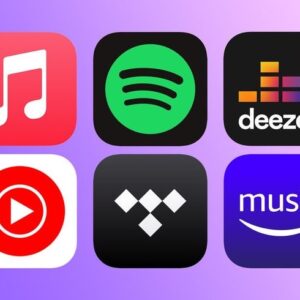
Artists today are increasingly aware that algorithms on platforms like Spotify, Apple Music, and YouTube Music play a crucial role in determining which songs get promoted and recommended. As a result, many musicians tailor their music to be “playlist-friendly”—crafting tracks that are catchy, have strong hooks, and are generally upbeat or easy-listening to fit well within curated playlists. These algorithms favor songs that quickly capture listener attention, encouraging artists to create shorter tracks (often under three minutes) with immediate appeal, as listeners are more likely to skip songs that don’t grab them right away.
Shift Toward Singles and Shorter Songs
The dominance of streaming has led to a decline in the traditional album format, with artists focusing more on releasing singles and shorter songs. This trend is driven by the need to maximize streaming numbers, as shorter songs can be replayed more frequently, boosting an artist’s chart performance. The playlist culture also means that listeners are less likely to engage with full albums, prompting artists to prioritize standalone hits over cohesive bodies of work.
Genre Blending and Accessibility
Streaming platforms have made it easier for listeners to explore a wide variety of genres, encouraging artists to experiment with genre-blending and hybrid styles. The global reach of these platforms means that artists can draw inspiration from diverse musical traditions and incorporate elements from different cultures, resulting in more eclectic and globally influenced chart-topping hits. For example, Latin, Afrobeat, and K-pop influences are now common in mainstream pop and hip-hop tracks.
Pressure for Consistency and Adaptability
The constant demand for new content and the pressure to maintain relevance in a highly competitive streaming environment push artists to release music more frequently. This can lead to a focus on quantity over depth, though it also encourages innovation and adaptability as artists seek to stand out in a crowded marketplace
Summary Table: Streaming’s Influence on Musical Styles
| Streaming Influence | Impact on Musical Style |
|---|---|
| Algorithm-driven curation | Shorter, hook-driven, playlist-friendly songs |
| Singles over albums | Emphasis on standalone hits |
| Genre blending | More eclectic, globally influenced styles |
| Frequent releases | High output, innovation, and adaptability |
Streaming platforms are thus driving chart-topping artists toward more accessible, algorithmically optimized music, while also fostering greater genre diversity and creative experimentation
Why are musicians shifting toward shorter, more repetitive songs for streaming success?
Musicians are increasingly shifting toward shorter, more repetitive songs to maximize success on streaming platforms due to several key factors rooted in the economics, algorithms, and listener habits of digital music consumption.
Streaming Payment Models and Revenue Maximization
Streaming services pay artists based on the number of plays a song receives, not the song’s duration. This means that shorter songs can be played more times in the same period, potentially generating more revenue for the artist. For example, streaming ten 31-second tracks pays more than a single stream of a 310-second song, all else being equal. This financial incentive encourages artists and producers to create concise, catchy tracks that listeners are likely to replay.
Algorithmic Playlisting and Listener Retention
Streaming platforms’ algorithms favor songs with low skip rates and high listener retention. Shorter songs with immediate hooks and minimal intros are more likely to keep listeners engaged until the end, reducing the chance of skips. This increases the likelihood of a song being featured in curated playlists, which drives further streams and exposure. The chorus or main hook often appears earlier in the song to capture attention quickly, and traditional elements like bridges or long solos are often omitted.
Attention Span and Viral Potential
Modern listeners, influenced by social media and digital content, have shorter attention spans and are accustomed to consuming bite-sized content. Shorter, repetitive songs are more likely to be remembered and shared, especially on platforms like TikTok, where brief, catchy snippets can go viral and drive massive streaming numbers. Artists are aware that viral success on social media can lead to chart success, so they tailor their music accordingly.
Genre and Style Adaptation
The pressure to succeed on streaming platforms has led to the rise of “Spotify-core” or playlist-friendly music—mellow, mid-tempo, and repetitive tracks designed for passive listening and broad appeal. These songs are engineered to blend seamlessly into playlists and avoid triggering skips, further reinforcing the trend toward brevity and repetition
Summary Table: Why Shorter, More Repetitive Songs?
| Reason | Explanation |
|---|---|
| Streaming payment model | More plays of shorter songs = more revenue |
| Algorithmic playlisting | Lower skip rates and high retention = more playlist inclusion |
| Attention span & virality | Shorter, catchy songs are more likely to be shared and remembered |
| Genre/style adaptation | Playlist-friendly, repetitive tracks are favored by streaming algorithms |
In summary, artists are shifting toward shorter, more repetitive songs to align with the economic incentives, algorithmic preferences, and listening habits shaped by streaming platforms
How do shorter songs increase artists’ streaming revenue and visibility?
Shorter songs increase artists’ streaming revenue and visibility through several interconnected mechanisms driven by streaming platform economics, listener behavior, and algorithmic promotion.
More Streams in Less Time
Streaming platforms pay artists based on the number of times a song is played rather than its duration, as long as the minimum playtime threshold (usually 30 seconds) is met. Shorter songs can be replayed more frequently within a given period, increasing the total number of streams and thus the potential revenue generated. For example, a listener could stream a two-minute song three times in the time it takes to play a six-minute song once, tripling the streaming count for the shorter track.
Lower Skip Rates and Higher Retention
Shorter songs with immediate hooks and catchy choruses are less likely to be skipped by listeners, which is crucial for algorithmic success. Platforms like Spotify and Apple Music prioritize songs with high retention rates and low skip rates in their recommendations and playlists. This means that shorter, attention-grabbing tracks are more likely to be featured in curated or algorithmic playlists, leading to increased visibility and further boosting streaming numbers.
Playlist Optimization and Discovery
Playlists are a major driver of music discovery on streaming platforms. Shorter, hook-heavy tracks fit seamlessly into playlists and are more likely to be included by both algorithm-driven and human-curated lists2. Inclusion in popular playlists exposes artists to new audiences, which can lead to viral growth and chart success.
Social Media and Viral Potential
The rise of platforms like TikTok, where short, catchy snippets of songs are used in videos, amplifies the impact of shorter songs. Artists whose tracks have a memorable, repeatable hook are more likely to go viral on social media, which in turn drives listeners to streaming platforms to hear the full song. This creates a feedback loop: viral social media moments lead to more streams, which increase visibility and can result in further playlist placement.
Adaptation to Shorter Attention Spans
Modern listeners, especially younger audiences, have shorter attention spans and are more likely to skip songs that do not immediately engage them. Shorter songs that get to the hook quickly are better suited to these consumption habits, making them more likely to be played in full and shared.
Summary Table: How Shorter Songs Boost Revenue and Visibility
| Mechanism | Impact on Artist Revenue and Visibility |
|---|---|
| More streams in less time | Higher total plays, increased revenue |
| Lower skip rates | Better algorithmic promotion, playlist inclusion |
| Playlist optimization | Greater exposure to new audiences |
| Social media virality | Viral trends drive listeners to streaming platforms |
| Adaptation to attention spans | Higher retention, more shares, and increased streams |
Pioneer Musicians of Modern Music
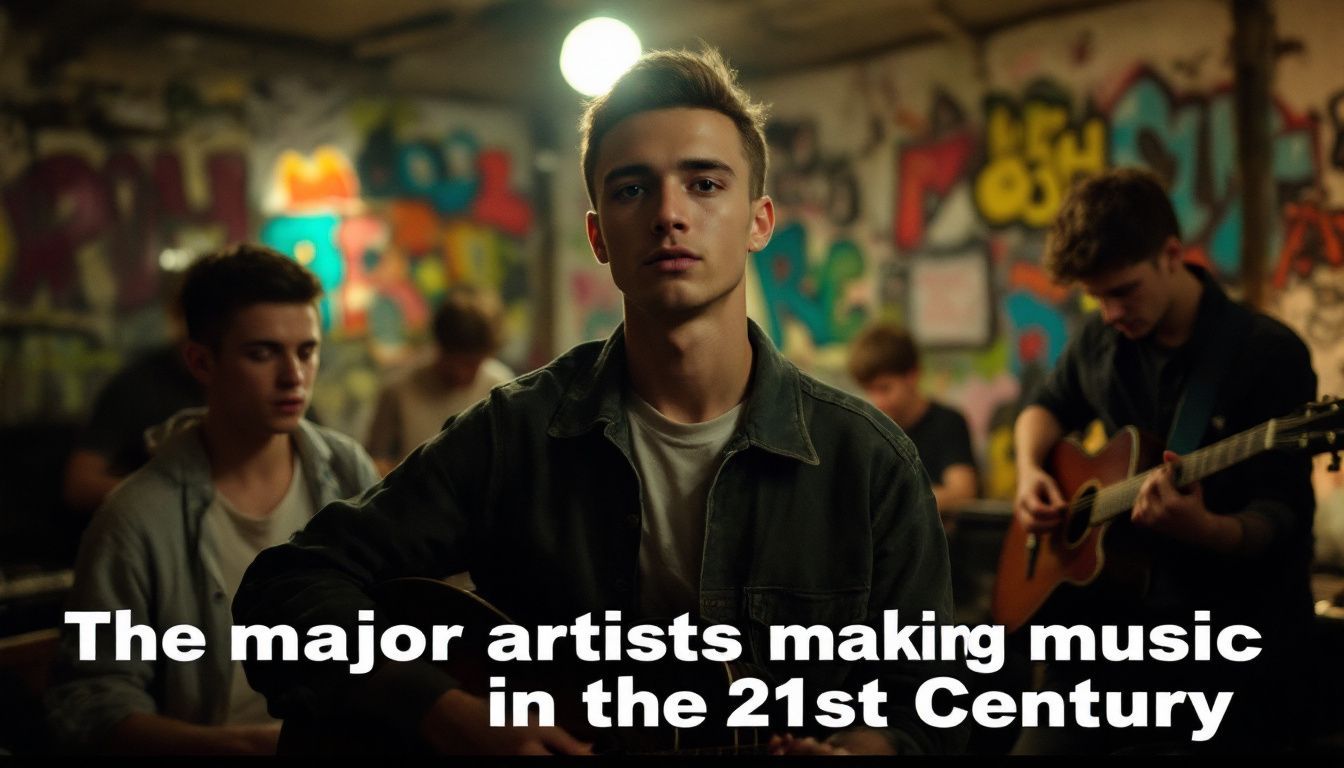
The music scene today owes a lot to the pioneer musicians who reshaped it. Artists like Kendrick Lamar, Beyoncé, and Taylor Swift have set new heights with their groundbreaking albums and songs.
Kendrick Lamar
Kendrick Lamar is a big name in modern music. He shook the world with his album that talks about life’s real struggles and society. His songs, like “Humble,” make listeners think deep while they enjoy the beat.
Kendrick doesn’t just sing; he tells stories that reflect on personal growth and social issues.
As a musician he has won many awards, showing how much people respect his work. Fans and critics alike wait for his new songs eagerly because they know Kendrick brings fresh sounds every time.
Music can speak things that cannot be expressed.
Beyoncé

Kendrick Lamar sets a high standard in music. Now, let’s look at Beyoncé. She is one of the most influential musicians today. Her music crosses many genres, from R&B to pop and hip-hop.
Beyoncé has released several successful albums that are known for their cultural impact.
She has won numerous awards for her work, including Album of the Year honors. With hits like “Single Ladies” and “Crazy in Love,” she keeps fans engaged. Beyond music, she uses her platform to support social causes and empower women.
Her influence reaches far beyond just sound; it shapes culture itself.
Beyoncé’s partnership with Jay-Z shows her versatility as an artist. They produced powerful songs together like “Drunk in Love.” Each project reveals more about her talent and drive.
Whether performing live or creating new tracks, she remains a dominant force in 21st-century music.
Taylor Swift
Taylor Swift is one of the most influential musicians of the 21st century. She has changed the music scene with her storytelling and catchy tunes. From country to pop, she blends genres in a unique way.
Her albums have sold millions, showing her wide appeal. Songs like “Shake It Off” and “Love Story” captivate fans globally.
Swift’s journey started as a teenager, writing songs about her life. Over time, she grew into a powerful voice in music and culture. With each album, she explores new themes and styles.
Taylor’s work inspires many young artists today to express themselves freely.
Influencers in Pop and Hip-Hop
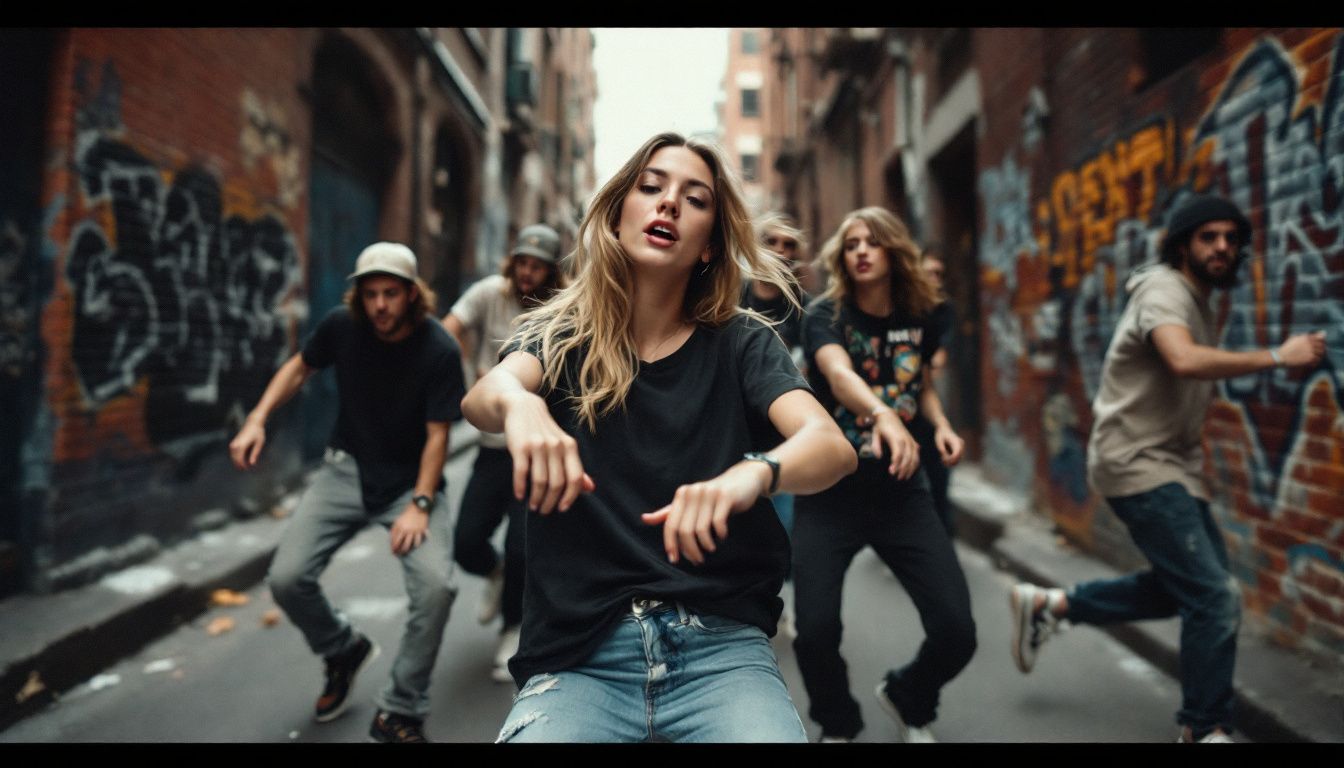
Pop and hip-hop are full of big names who shape music today. Stars like Rihanna and Kanye West push boundaries with their bold styles and catchy beats… Their impact on culture is huge, making waves everywhere.
Rihanna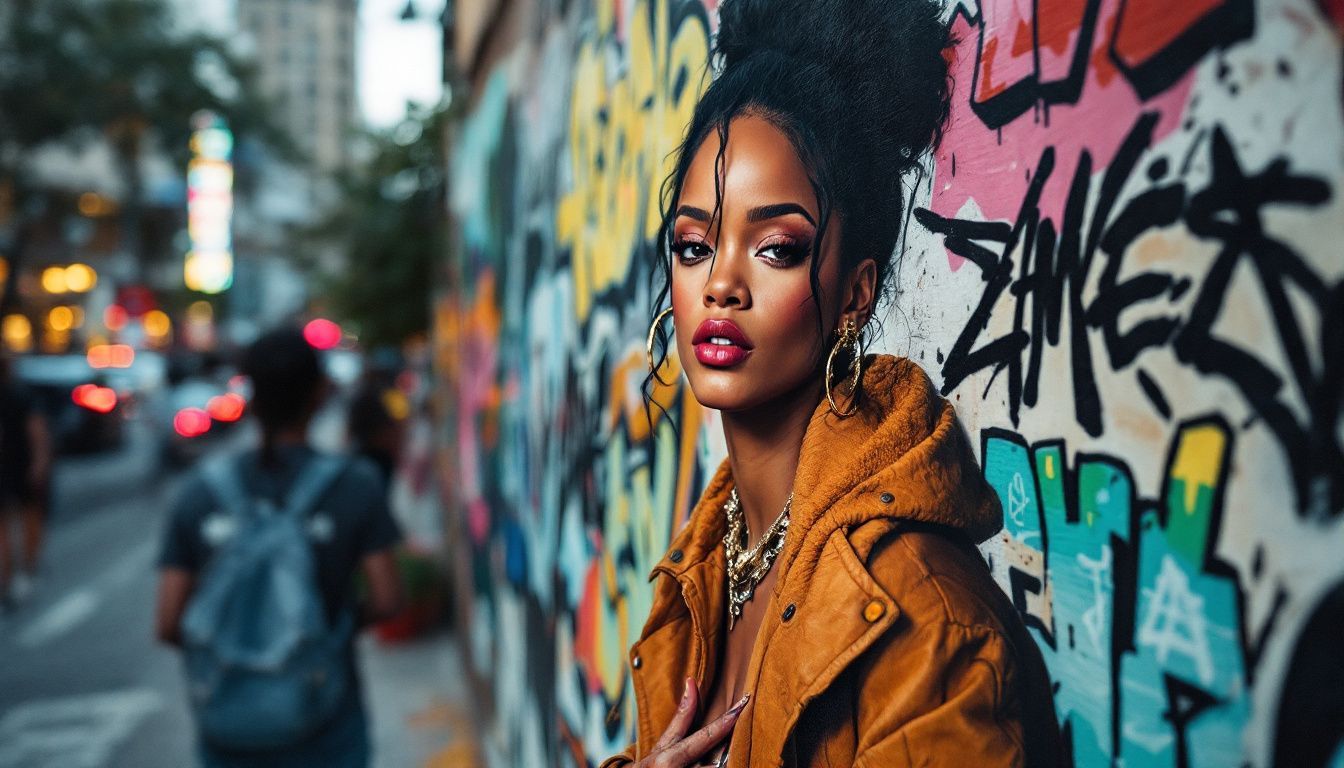
Rihanna stands out as an influential artist in the 21st century. She blends different styles, from pop to reggae. Songs like “Umbrella” and “We Found Love” showcase her range. With over 200 million records sold worldwide, she ranks among the best-selling artists ever.
Her impact goes beyond music. Rihanna uses her platform for social change. She promotes ideas about equality and empowerment. Her song “Work” highlights her unique sound while also touching on themes of hard work and resilience.
Kanye West has produced tracks for her, adding to their collaboration history. Rihanna’s influence continues with hits like “Diamonds” and “Lift Me Up.” The world watches as she evolves, always pushing boundaries in music and fashion alike!
Kanye West
Rihanna’s influence in music sets the stage for Kanye West. He is a major player in 21st-century music. Kanye has released ten studio albums. His work includes hits like “Stronger” and collaborations with stars such as Beyoncé and Jay-Z.
In fact, he has produced over 150 albums for other artists.
Kanye blends genres to create a unique sound. He mixes rap with pop and even gospel influences. This ability helps him shape modern hip-hop culture. Songs like “Gold Digger” showcase his knack for catchy hooks and clever lyrics.
His impact goes beyond just music. Kanye often sparks conversations about art, fashion, and society too—making him one of the most talked-about figures today. Through all his successes, he continues to challenge norms and push boundaries in the industry.
Jay-Z
Jay-Z is a major force in music today. He has released ten studio albums and produced over 150 albums for artists like Beyoncé and Kanye West. His impact goes beyond music; he reshaped hip-hop culture and business.
Jay-Z’s style fuses different genres, blending rap with pop and R&B elements.
His song “Empire State of Mind” became an anthem for New York City. With hits like “99 Problems” and “N****s in Paris,” he shows his storytelling skill. Jay-Z also launched the streaming service Tidal, changing how people listen to music.
Beyond his musical talent, he has made a significant mark on society through activism and philanthropy.
Breakthrough Musicians
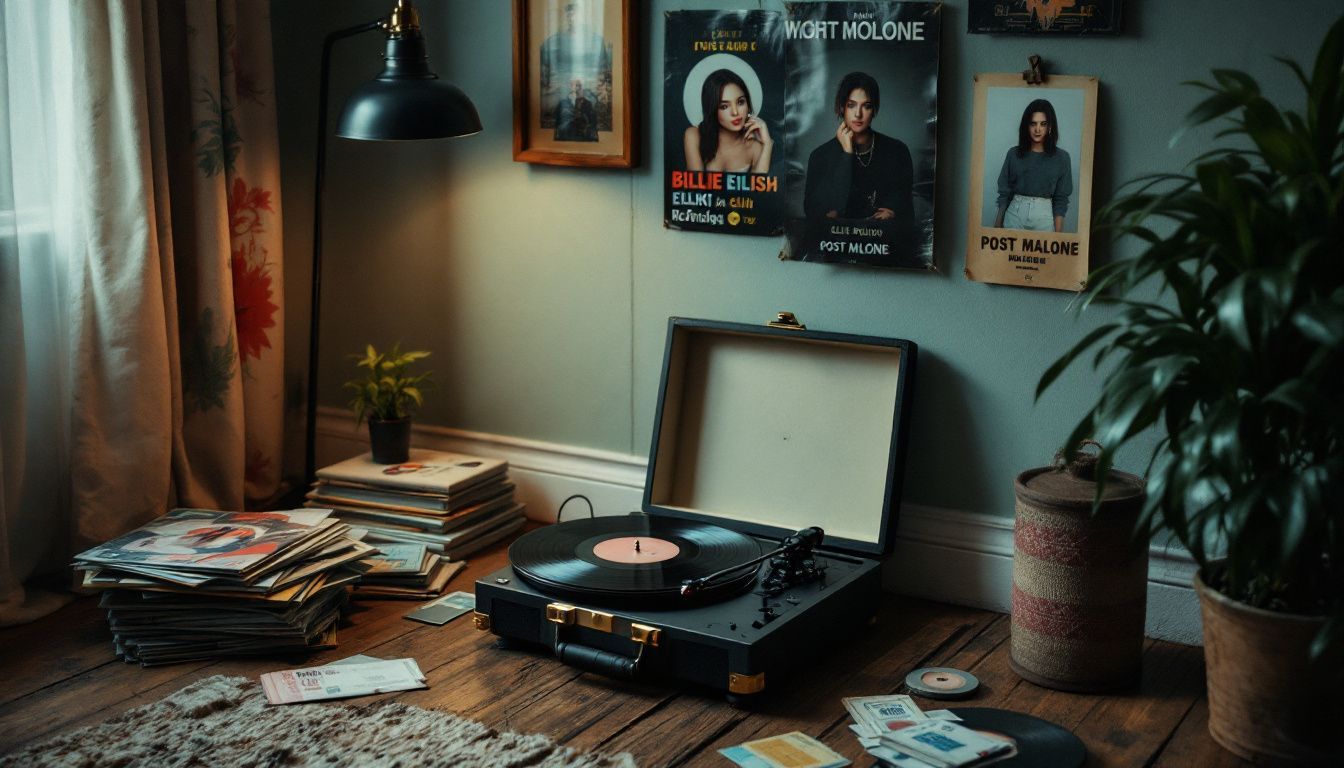
Breakthrough artists are shaking up the music scene with fresh sounds and unique styles. Billie Eilish, Olivia Rodrigo, and Post Malone have gained huge popularity in a short time.
Their songs connect with fans on deep levels. They tell stories that touch hearts. Explore their journeys and see how they shaped modern music today!
Billie Eilish
Billie Eilish is a true star of the 21st century. She gained fame quickly with her unique sound and style. Born in 2001, she and her brother Finneas created music at home. Her debut album, “When We All Fall Asleep, Where Do We Go?” shook up the music scene.
It showcased her raw talent and deep lyrics.
Eilish’s songs often explore complex feelings. Tracks like “Bad Guy” grab attention with catchy beats and bold themes. She stands out for being different from typical pop stars. Billie has won multiple Grammy Awards, including Album of the Year.
Her influence continues to grow as younger fans connect with her message.
She also speaks on important issues like mental health and climate change. Through her art, Eilish inspires many to embrace their true selves. With millions of streams worldwide—she shows that making real connections matters more than just chart-topping hits.
In this ever-changing music landscape, Billie Eilish remains a powerful voice for a new generation.
Olivia Rodrigo
Olivia Rodrigo burst onto the music scene in 2021. Her debut album, “SOUR,” took the world by storm. It showcased her youthful energy and raw emotion. Songs like “drivers license” and “deja vu” topped charts globally.
This young artist quickly became a voice for her generation.
Her style mixes pop and rock, creating a fresh sound. Rodrigo’s lyrics connect deeply with listeners, reflecting heartbreak and self-discovery. She draws inspiration from past stars like Taylor Swift and Paramore.
Critics praise her ability to craft catchy hooks while sharing honest stories.
In just a few years, she made a significant impact on society through her music. Olivia shows that age doesn’t limit talent or creativity. With each song, she proves she’s not just another teen star; she’s here to stay.
Post Malone
Post Malone is a key figure in 21st-century music. He blends various styles, mixing pop, hip-hop, and rock in his songs. Hits like “Circles” and “Sunflower” show his artistic range.
His unique sound connects with many fans worldwide.
Since breaking onto the scene, Post Malone has achieved significant success. He has topped charts and broken records for album sales. His work showcases how modern artists can shape music today.
With catchy tracks like “Rockstar,” he continues to influence the industry.
Honorable Mentions

Some musicians deserve a shout-out, even if they didn’t top the charts. The Arctic Monkeys bring fresh sounds to rock while Frank Ocean crafts deep emotions in his music.
Arctic Monkeys
Arctic Monkeys is a British band that formed in 2002. They quickly gained fame for their unique sound and catchy lyrics. Their debut album, “Whatever People Say I Am, That’s What I’m Not,” became the fastest-selling debut album in UK history.
Their music blends rock with elements of indie and pop, making them popular worldwide.
The band’s lead singer, Alex Turner, has been praised for his clever songwriting. He crafts stories about life and love that resonate with many fans. Hits like “I Bet You Look Good on the Dancefloor” showcase their energetic style and raw talent.
Arctic Monkeys continues to influence modern music as they push boundaries while maintaining their signature sound.
Collaborating with artists also sets them apart. They have worked with producers like James Ford for several albums, shaping their distinct vibe over the years. Albums such as “AM” include tracks that mix different genres while keeping a strong identity—songs like “Do I Wanna Know?” reflect this blend perfectly.
The band’s impact on society can be seen through how they inspire new musicians today.
Frank Ocean
Frank Ocean is a standout artist of the 21st century. He changed modern music with his unique sound and style. His albums like “Channel Orange” and “Blonde” showcase his innovative approach.
Frank merges R&B, pop, and hip-hop seamlessly. Songs such as “Thinking Bout You” and “Nikes” show his lyrical depth.
His storytelling captures real-life emotions. Frank’s work often reflects personal struggles, love, and identity. He has influenced many artists today. Musicians look up to him for inspiration in their own music journeys.
Frank Ocean has earned numerous awards, proving his impact on society and culture.
He doesn’t shy away from tackling hard subjects either—like mental health or sexuality—in songs like “Self Control.” This openness resonates with fans everywhere. When he performs live, people feel every word he sings; it’s powerful! His dedication to changing music makes him a true icon of our time.
Conclusion
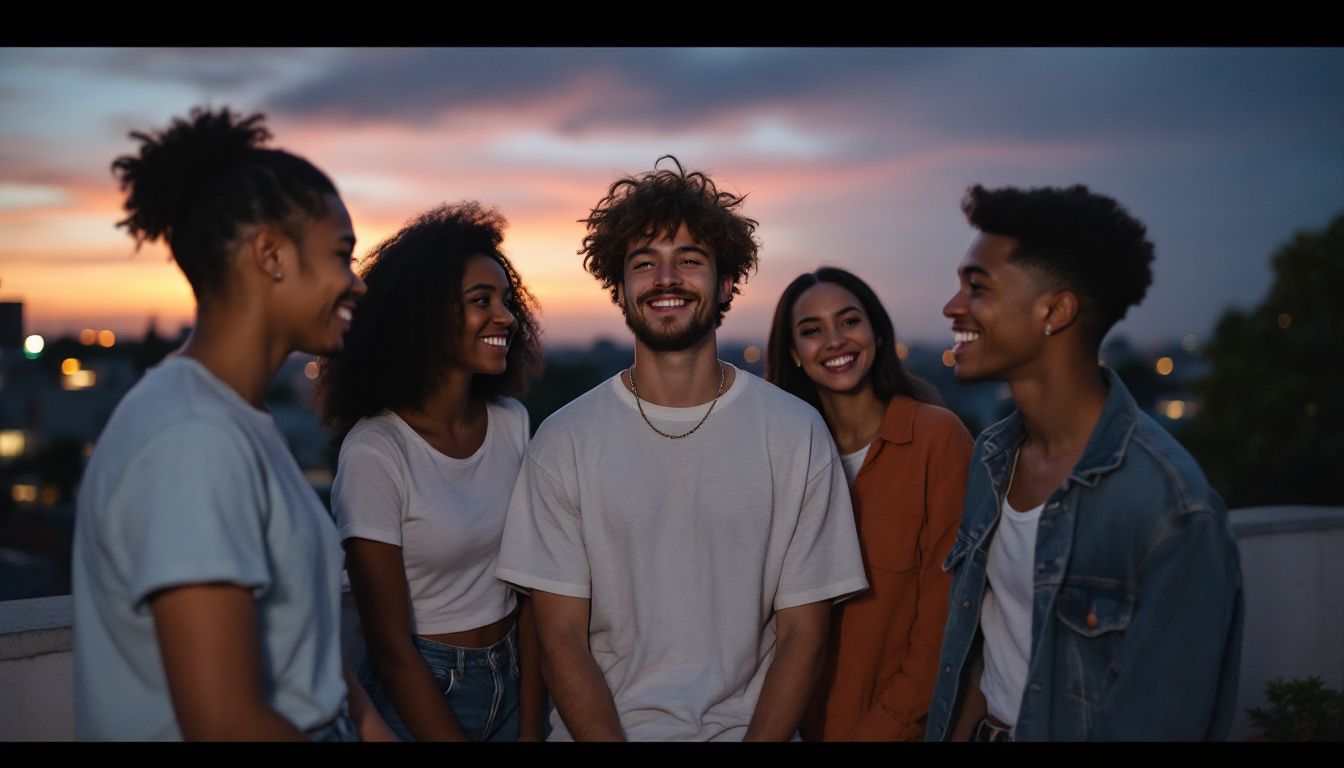
The 21st century is full of amazing music. Artists like Kendrick Lamar, Beyoncé, and Taylor Swift changed the game. They blend styles and create new sounds. Breakthrough stars like Billie Eilish and Olivia Rodrigo show us fresh talent.
Music today offers more choices than ever before.
How can you explore these artists? Listen to their hits! Discover how they influence culture. Embrace this vibrant music scene—it’s alive with energy and innovation. Keep your ears open for what comes next!
FAQs
1. Who are some of the major artists making music in the 21st Century?
Major artists who have made significant contributions to music in the 21st Century include Bruno Mars, Amy Winehouse, Lana Del Rey, Carrie Underwood, Cornell Haynes Jr., also known as Nelly, and Cardi B.
2. What are some notable songs from these artists?
These artist’s discography includes hits like “Back to Black” by Amy Winehouse produced with Mark Ronson, “Uptown Funk” by Bruno Mars and Mark Ronson; “When Love Takes Over” and “I Gotta Feeling” featuring David Guetta; Carrie Underwood’s country music classics like “Jesus Take The Wheel”, and “Before He Cheats”; Cardi B’s breakout hit “Bodak Yellow” and her album “Invasion of Privacy”.
3. How has pop culture been influenced by these musicians?
Pop culture has been greatly shaped by these musicians through their unique sounds — from Lana Del Rey’s ethereal voice on tracks like ‘Dance The Night Away’, to Maroon 5’s catchy tunes such as ‘Sugar’ or ‘Girls Like You’. They’ve introduced new rules for what constitutes a hit song.
4. Have any of these artists ventured into different genres?
Yes indeed! Artists like Nellyville (Cornell Haynes Jr.) have dabbled in country music with songs like Dilemma while others such as Curtis Jackson pushed boundaries with albums like Get Rich Or Die Tryin’.
5. Are there any emerging trends among these top artists?
A trend worth noting is that many of them incorporate elements from other genres into their work – Kesha’s EDM-influenced sound or Lorde’s minimalist approach on Pure Heroine are examples.
6. What impact do you think they will continue to have moving forward?
Their influence extends beyond just their music – they’re setting trends, influencing style, and shaping the way future artists will approach their craft. Their innovative use of music has paved the way for new sounds and genres to emerge.


 Cart is empty
Cart is empty 






